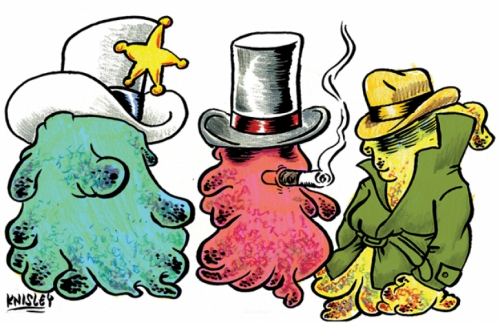As a dad of two young kids, I was fairly confident that dirty diapers had no redeeming qualities. Apparently I’ve been misguided. These days, soiled nappies are good as gold to researchers interested in gut microbes.
Germ-free while in the womb, babies are exposed to beneficial bacteria, such as Lactobacillus, in the birth canal during delivery. Researchers are linking increased rates of childhood allergies and asthma to Caesarean section and the lack of a typical bacterial ecology at birth.
Breastfeeding also seems beneficial for bacterial balance. Sartor says that premature infants are susceptible to necrotizing enterocolitis, a devastating overgrowth of bad gut bacteria. “But that’s almost universally found in formula-fed babies, not breastfed babies,” Sartor says. Breast milk provides a steady influx of beneficial bacteria, he adds, “and there’s abundant evidence that gut bacteria colonized early in life induce protective immune responses.”
The theory is that vaginal birth and breastfeeding help babies acquire a healthy gut bacterial ecology, which helps the immune system ward off chronic ailments later in life. Right now findings are mostly correlative, not causative. But researchers, including some at UNC, have already found that diet affects babies’ bacterial balances. The evidence is in the diapers.
Andrea Azcarate-Peril, a microbiologist who directs the Microbiome Core Facility, studied bacterial compositions in baby poop to find that breastfed babies have many more Firmicute bacteria than formula-fed infants. Firmicutes is a large phylum that contains classes and genera of beneficial bacteria. Azcarate-Peril also found that formula-fed babies have bacterial patterns similar to adults’. That’s not good. Other researchers have found that too many adults have bacterial imbalances, which are being linked to chronic conditions, such as diabetes associated with obesity.
“Not all diseases are a result of the microbiota,” Azcarate-Peril says. “But if there’s an imbalance, it affects you.” If babies don’t get proper amounts of so-called good bacteria early in life, there could be consequences later on.
Anthropologist Amanda Thompson is trying to connect the dots. Every week for fifteen months, she collected soiled diapers from thirty-two families. Back at her lab she analyzed the poop and found that babies who are fed formula and solids in addition to breast milk have higher levels of the hormones that promote body fat. Now she’s using the Microbiome Core Facility to analyze bacterial composition. Her preliminary results show that babies who drink formula and eat solid food early in life have less Firmicutes. And because she got samples from babies every day or every week, she could see when the changes in bacterial composition happened over time and when parents altered their babies’ diets. She will use more detailed DNA tests to pinpoint which genera and species are most involved, but the fact that formula-fed babies have fewer good bacteria and higher hormone levels doesn’t bode well.
Those are two of the underlying factors in obesity. Beneficial bacteria help us digest food. As endocrinologist Kay Lund points out, lean people have different bacterial ecologies than overweight people.
Lund has implicated bacteria in type 2 diabetes, which can be a consequence of obesity. She found that a high-fat diet triggers inflammatory responses in the small intestines and colon long before the animals gain weight. Germ-free animals that don’t have bacteria don’t get the intestinal inflammation, insulin resistance, or weight gain even when they eat as much fat as regular rats. She also found a strong correlation between bacteria-induced inflammation and insulin resistance, which can lead to diabetes.
It may seem strange that bacterial imbalances in our guts play roles in diabetes, asthma, and allergies. But that’s what researchers find fascinating about this particular line of work. As gastroenterologist Yehuda Ringel says, because we know so little about the human microbiota scientists can check how bacteria relate to just about any disease or disorder they can think of. And the correlations and causations between bacteria and disease are piling up.










